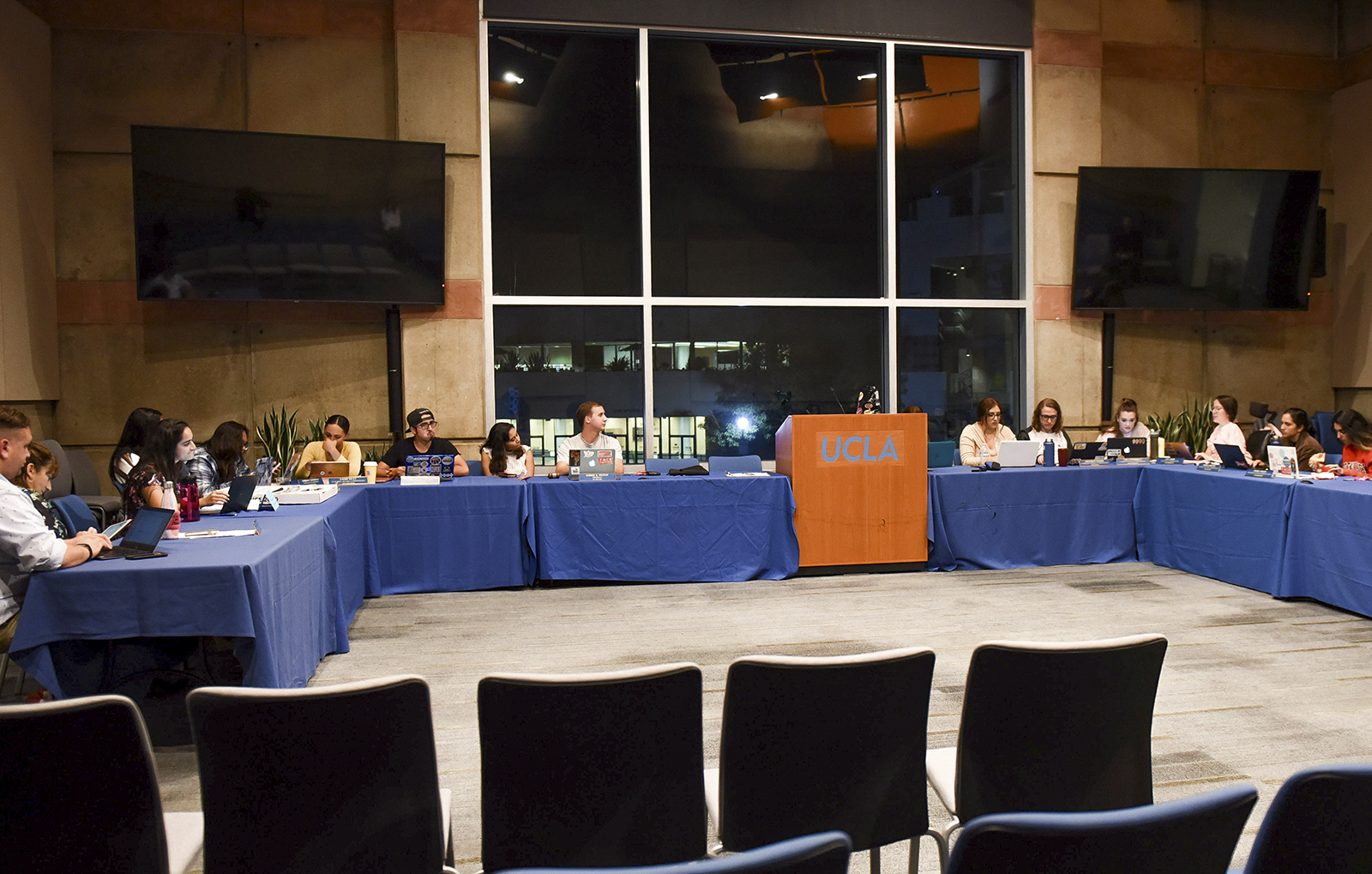USAC’s new election code still fails to remedy issue of low voter turnout

The Undergraduate Students Association Council has revised its election code in an attempt to increase voter turnout, but such efforts won’t be enough to pique students’ interests. (Daily Bruin file photo)
By Mark McGreal
Feb. 10, 2020 11:03 p.m.
The Undergraduate Students Association Council announced sweeping changes to its election code last month, but these changes feel a lot like plastic surgery – mainly for show and lacking substantive value.
On Jan. 21, USAC voted to change the election code in order to promote greater clarity and transparency. These changes included lowering the threshold to get an advisory vote on an election ballot from 10% of the student population to 5%, making the election code more accessible in order to encourage people not in USAC to run and potentially implementing physical polling stations on campus.
And after experiencing the lowest voter turnout in over a decade in 2019, it’s no wonder the council is trying to change things up.
But USAC’s changes attempt to build upon a foundation that doesn’t exist.
While perhaps necessary in the future, these changes to the election code don’t address the real issues with USAC elections – students are apathetic and uninformed about USAC and its activities. Most students aren’t even voting, and even fewer are using tools to increase their voice in the student government, like advisory votes. These changes aren’t going to push more voters to the polls – they’re just bureaucratic updates to an outdated document.
Simply put, USAC needs to spend less time editing guidelines and more time actually interacting with the student body.
Because right now, students seem to care less about USAC than ever – and USAC knows it.
“The voter turnout in recent years has quite honestly been pathetic,” said Navi Sidhu, a fourth-year psychobiology student and Undergraduate Students Association Elections Board chair.
Pathetic is the right word.
As recently as 2016, the USAC elections saw over 40% of the undergraduate student population vote. That number dipped to 27% in 2017 and fell to 16% in 2019.
Clearly, more student input leads to a more accurate picture of students’ wants and needs.
But USAC’s current plans won’t help paint that picture.
Reducing the signature threshold for adding advisory vote measures to the ballot is how USAC plans to solve voter apathy. An advisory vote is a nonbinding poll added to the ballot in order to gauge the thoughts of the student populace on a particular issue. This method of representation allows students to directly voice concerns to their USAC representatives.
It could be a helpful place to start – if students had any idea what an advisory vote was.
Brandon Broukhim, general representative 3 in USAC, said not a single advisory vote made it on the ballot last year.
“I don’t think it’s something students think about,” Broukhim said. “I don’t think it’s been explored as a tool to increase voter turnout.”
And even if the students knew about advisory votes, it won’t fix the issue of voter turnout. Getting 5% out of over 31,000 students is still no small task, amounting to at least 1,500 students. Increased voter turnout as it relates to the advisory vote hinges on the hope that students will both know about this process and know how to use it.
Many students don’t even know when USAC elections take place.
To increase awareness for the elections and possibly increase voter turnout, Sidhu is looking into supplemental physical polling stations on campus.
While this may encourage a few students who don’t know about USAC voting to actually cast a vote, it won’t dramatically increase the number of voters. Going to a physical polling station takes time and effort most students don’t seem willing to expend.
Students barely vote now when they can vote from anywhere on their phones. Instead of making progressive moves to improve the future of voting, USAC seems stuck in antiquated methods of vote gathering. USAC is so insulated from the student body that it seems to have forgotten what century students are living in.
Even if the physical voting stations do increase publicity for the elections, they will take up resources that may be better used for fliering or social media exposure to raise election awareness. By better engaging with the student body through marketing campaigns, USAC can reach out to more students without asking them to waste their time standing in a line to vote. These marketing campaigns could also run year-round in order to expose students to more of USAC’s projects.
Samuel Ellison, a third-year mechanical engineering student, said he didn’t know much about USAC and didn’t think physical polling stations would convince students to vote.
“Even if there were physical polling stations, I probably still wouldn’t vote because I don’t know anything about USAC or what they do,” Ellison said.
Ellison is not alone in this. Many students seem unaware of USAC’s function and purpose. The average student sees campaign signs on Bruin Walk during election season, but never again throughout the academic year. USAC meets consistently to talk about issues, but students don’t seem to know where or when.
Some would argue that the biggest takeaways from the changes made are more related to transparency and accessibility for candidates. USAC has edited the elections board code to fix paradoxical paragraphs and more clearly state rules for campaigns. These changes will make it easier for people to run and campaign in a fair, equitable way.
But nobody cares who’s running if only a fraction of the student population is actually voting. Instead of focusing on the candidates, USAC and the elections board should focus on getting a majority of students to vote. Or at least more than 20% of students.
USAC’s election code changes may have good intentions, but they feel more like an insider change.
But more than anything, USAC needs to change for the students on the outside.

